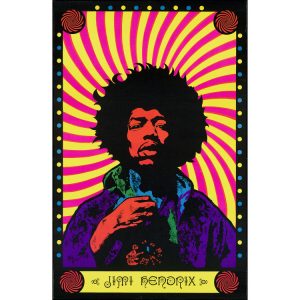Jimi Hendrix made a lasting impact on the rock music scene of the late 1960’s. He revolutionized the way key elements of the genre, like the electric guitar, were played but also how they were understood.1 Despite his short life and even shorter career, the impression he created on American music and culture is palpable even today. You can see him on t-shirts, skateboards, and every throwback playlist on Spotify. His voice, image, and identity are something people gravitated towards during the late ’60’s and early 70’s, just as they do now.
As a black man he stood out against his white peers, like Jim Morrison, The Rolling Stones, and Bob Dylan. Many believe that his exceptional musical performances stood out because of the uniqueness as his position as a black man. Though there is a great amount of evidence to support this I contend that his significant musical abilities and his position as a powerful black man worked in tandem to elevate his position as an influential black musician. His race was something deeply rooted in his music and his career. Though he catered to mostly white audiences at his more popular venues, like Woodstock, he continually made attempts to perform to black audiences as well. 2 The pain and power that went into his music was also something that was deeply influenced by his identity and his experiences. His first songwriting success, “Stone Free” talks about breaking free of societal pressures, which for him would have included the oppression he faced due to racial prejudice and backlash.
The elements of his music that stemmed from his personal life are what made his music so unique. The creative elements of his music encouraged freedom and persistence but, in contrast, the pressure of the music industry ended up being Hendrix’s tipping point. He died from side effects of his drug use.3 His influence in the music industry lives beyond him and he will forever be remembered as one of the most influential black musicians ever.


